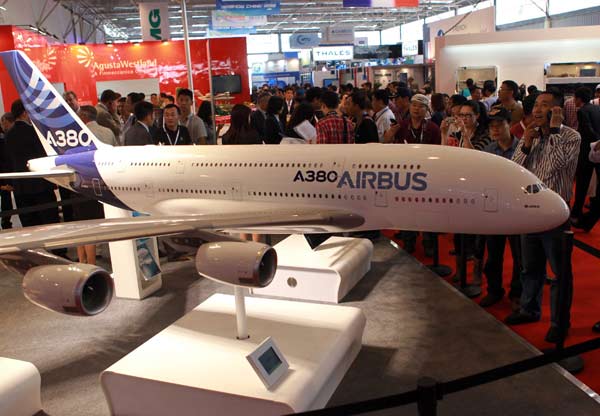
|
 |
|
An Airbus SAS A380 model aircraft at last month's Airshow China 2012 in Zhuhai, Guangdong province. Zhang Mingzhou / For China Daily |
Company gains ground on rival Boeing in race to dominate market
When Peter Tiarks made his first trip to China nearly 30 years ago onboard the first ever Airbus aircraft demonstration tour to the country, Boeing aircraft dominated the Chinese skies.
Airbus SAS sold its first aircraft, an A310, to China two years later in 1985. Boeing Co had a 13-year head start.
But now Airbus is delivering two aircraft to China on average each week, and it controls 49 percent of the Chinese market for planes with more than 100 seats.
|
 |
|
Peter Tiarks, vice president of customer services for Airbus China |
The question of how to serve the ever-increasing Airbus fleet in China - now with around 850 jets - tops the agenda for Tiarks, Airbus China vice-president for customer services.
Tiarks' answer to that challenge is to go beyond ensuring the quality and efficiency of basic support, and offer value-added services to help airlines improve their operations.
As oil prices surge to record-high levels, the European aircraft manufacturer believes it can help airlines save costs not only by building more fuel-efficient planes, but also through customer services, which meet the airlines' need for cost-effective outsourcing options, and help save costs in areas such as logistics, flight operations and engineering processes.
"The idea is that we take certain parts of the airlines' responsibilities, such as maintenance or engineering. We call it `tailored support packages'," Tiarks said.
"We are well on track with the deployment of such services in China due to the open and innovative attitude of the Chinese airlines. Our intent is to deploy more and more enhanced services in China," he said.
The strategy is an essential part of an objective set by the EADS Group, Airbus' parent company, to generate 25 percent of its business revenue through services by 2020.
The European aerospace and defense conglomerate plans to have about 80 billion euros ($103.40 billion) in revenue by 2020, with 25 percent of the revenue expected to come from the high-value services.
Currently, services represent about 10 percent of the company's total revenues, which stood at 49 billion euros in 2011.
"We are well on track and, in fact, it's even possible to achieve the target ahead of schedule in China," Tiarks said.
Tiarks' confidence mainly comes from the fast-growing Airbus fleet in China. More than 100 Airbus planes are now delivered to China every year, which means that about 20 percent of the company's global production goes to China.
And that is thought to be just the beginning. As the world's fastest-growing commercial aviation market, China will need 5,260 new commercial aircraft, valued at $670 billion, over the next 20 years, Boeing said in its annual market outlook in September.
China is the world's second-largest market for domestic air traffic and the seventh largest for international passenger air traffic, according to the International Air Transport Association.
Flight hour services and spare parts logistics services are two packages well accepted by Chinese airlines, Tiarks said.
Flight hour services range from the supply of material and repairs to full maintenance. China Southern Airlines Co Ltd signed a contract with Airbus for customized flight hour services for its fleet of five A380s in April 2011. Airbus later signed similar agreements with Sichuan Airlines Co Ltd for its A330 fleet, and with Yangtze River Express Airlines Co Ltd for its A330 freighter fleet.